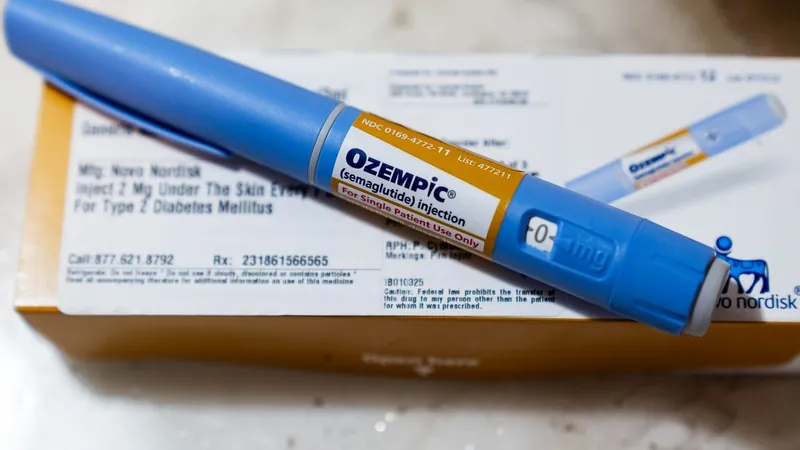
The Microdosing Trend: Is Taking Ozempic in Smaller Doses a Health Gamble?
2024-09-26
Author: Ting
The term "microdosing" has predominantly been associated with psychedelics, but it’s now making waves in discussions surrounding popular weight-loss medications like Ozempic, Wegovy, and Manjaro. The rising popularity of these drugs has transformed the pharmaceutical landscape as people seek them not only for weight loss but for numerous health benefits, including potential cognitive enhancement and combating nicotine cravings.
Recently, a mid-stage study highlighted that certain weight-loss medications might help slow cognitive decline, leading to increased interest in using these drugs for multi-faceted health purposes. With celebrities like Oprah Winfrey advocating for these treatments, the trend has only accelerated, prompting many to consider microdosing as a viable option.
Microdosing involves taking a smaller dose of medication than standard recommendations. According to Dr. Britta Reierson, an obesity medicine specialist, this tailored approach can be beneficial—provided it is guided by a healthcare professional. “It's a way to align the medication with the individual's needs,” she explains, emphasizing the importance of professional oversight to avoid adverse health outcomes.
Why Are People Turning to Microdosing?
The motivations for microdosing are diverse. For some, it’s about maintaining weight loss achieved through standard dosages, while others may only need to lose a minimal amount of weight or prefer a gradual approach. Cost can also be a factor, as some patients may find that smaller doses make these medications more affordable.
Dr. Aria Vazirnia, a lipedema surgeon, notes that the influence of social media and celebrity culture has sparked curiosity in weight-loss drugs among those who may not necessarily require them. The pervasive discussions on platforms like TikTok and various podcasts have further fueled this interest.
The Overlooked Emotional Toll
Another aspect contributing to the desire for microdosing is weight shaming. Dr. Alexandra Sowa points out that many individuals feel stigma surrounding the use of weight-loss drugs. They might believe smaller doses will mitigate feelings of guilt, even though the real issue lies in societal stigma rather than the medication itself. “We need to help patients feel comfortable seeking treatment without guilt,” she asserts.
The Risks of Unsupervised Dosing
While microdosing might seem appealing, experts warn against self-medicating without proper guidance. Side effects, lack of effectiveness, or even adverse reactions can occur if medications are misused. Dr. Brett Osborn, a neurosurgeon and longevity expert, emphasizes the necessity of adhering to prescribed dosages to maintain health, equating it to needing to constantly adjust the gas pedal while driving.
“Never blame the medication,” he says firmly. “It's essential that we, as physicians, manage and modulate dosages accurately.”
In Conclusion
The conversation around microdosing Ozempic is evolving rapidly, fueled by both medical interest and cultural influences. While there are potential benefits to this approach, the important takeaway remains: any modifications to medication regimens should always be done in consultation with a healthcare professional. The stakes are high, and safe practices must take priority amid this weight-loss phenomenon. Remain informed, stay safe, and don't let the pressures of social media dictate your health choices!

 Brasil (PT)
Brasil (PT)
 Canada (EN)
Canada (EN)
 Chile (ES)
Chile (ES)
 Česko (CS)
Česko (CS)
 대한민국 (KO)
대한민국 (KO)
 España (ES)
España (ES)
 France (FR)
France (FR)
 Hong Kong (EN)
Hong Kong (EN)
 Italia (IT)
Italia (IT)
 日本 (JA)
日本 (JA)
 Magyarország (HU)
Magyarország (HU)
 Norge (NO)
Norge (NO)
 Polska (PL)
Polska (PL)
 Schweiz (DE)
Schweiz (DE)
 Singapore (EN)
Singapore (EN)
 Sverige (SV)
Sverige (SV)
 Suomi (FI)
Suomi (FI)
 Türkiye (TR)
Türkiye (TR)
 الإمارات العربية المتحدة (AR)
الإمارات العربية المتحدة (AR)